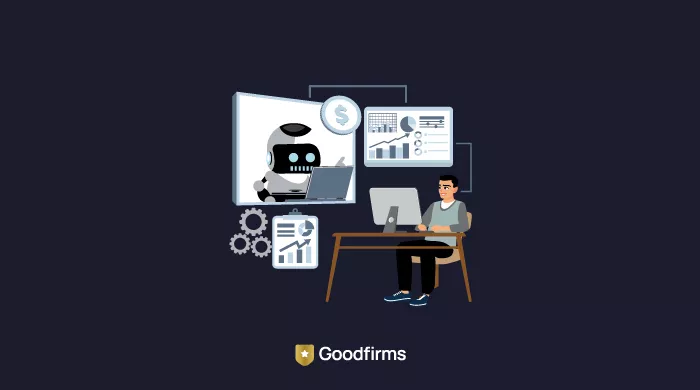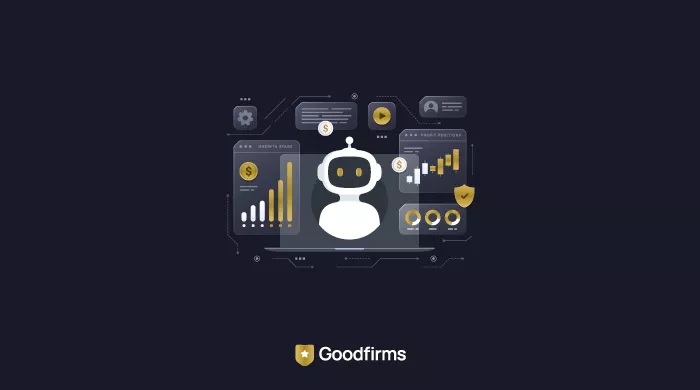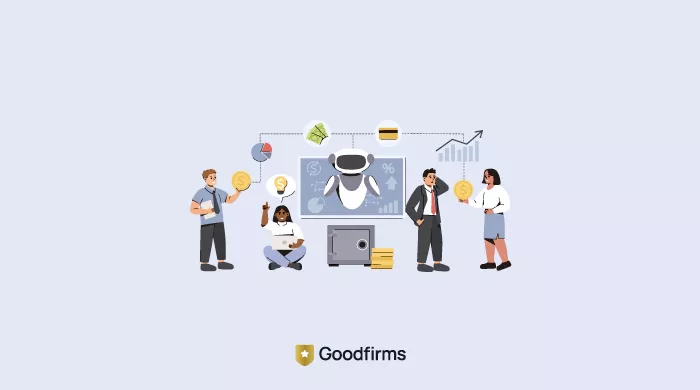Bill Gates once remarked, “A breakthrough in Machine Learning would be worth ten Microsofts.”
Have you ever searched for a product on Google or Amazon, and then after exiting the search, you still keep seeing ads about those products in other applications and browsers, offering discounted prices or other similar products? Is it magic? No, it’s Machine Learning.
Amidst the challenging scenario of cutting-edge mobile application development, developers are making the most of the advancements in artificial intelligence to empower their app development. Machine learning, in particular, has been gaining momentum for improving personalized user experience.
As a subsection in the field of AI, Machine Learning (ML) provides a revolutionary solution to leverage powerful features in mobile applications. Taking in consideration the fast computing abilities of mobile devices these days, top app developers can deploy machine learning natively.
Before diving into a more detailed discussion regarding the benefits of this disruptive technology for mobile app development, we should start from the basics by learning what exactly is Machine Learning.

What is Machine Learning? Meaning and Application:
The words Artificial Intelligence or AI get spoken about a lot. It is considered the future of technology, but exactly what does this concept signify? A lot of the time, when we are talking about AI, we are actually talking about Machine Learning. The branch of AI wherein the computer learns from data and performs tasks without being programmed explicitly for them.
IBM defines Machine Learning as follows, “Machine learning is a branch of artificial intelligence (AI) and computer science which focuses on the use of data and algorithms to imitate the way that humans learn, gradually improving its accuracy.”
The users today are looking for apps that are intuitive and convenient for them to use and satisfy their needs. Thus using machine learning is the easiest way for app developers to ensure that an app is user-friendly and intelligent.
Broadly speaking machine learning can be categorized into 3 main types:
-
Supervised Learning
This method uses labeled datasets to train algorithms to classify data or predict outcomes accurately. As more data is introduced into the model, the weights are adjusted until the model is fitted correctly. This happens during the cross-validation process to verify that the model does not overfit or underfit. Organizations can use supervised learning to tackle a range of real-world problems at scale, such as spam classification for your email account.
-
Unsupervised Learning
This method uses machine learning to analyze and cluster unlabeled datasets. Because of its capacity to find similarities and differences in data, it's perfect for exploratory data analysis, cross-selling techniques, consumer segmentation, and picture and pattern recognition. A few algorithms used in this type of learning are Hidden Markov models, k-means, hierarchical clustering, and Gaussian mixture models. Without the need for human intervention, these algorithms uncover hidden patterns or data groupings.
-
Reinforcement Learning
Reinforcement machine learning is a behavioral machine learning method that is comparable to supervised learning but does not use sample data to train the algorithm. Using trial and error, this model learns as it goes. To establish the optimal proposal or policy for a given situation, a series of successful outcomes will be reinforced. Some practical examples for this would be training robots to learn new rules or policies by making them watch videos instead of programming it in their software.
Machine Learning In Mobile App Development: Revolutionizing The Way Apps Work
The best mobile app development companies in the world incorporate machine learning in their application development to tap into the potential of mobile devices. The explosion of the IoT ecosystems (Internet of Things) rushes the world to expedite existing technologies through big data. Machine learning companies across the globe are in high demand as clients seek to improve their sore points in terms of better user-experience, security, design, etc.
To help you fully understand the ways in which machine learning can revolutionize the way apps work, let us take you through a few practical uses of this concept to help you create innovative applications.

1. Fraud Detection
As the general public, it is almost daily that we hear about credit card frauds or data leaks from big E-wallet companies. Banks and financial institutions are still struggling to detect and trace the ever-evolving fraudulent techniques that con artists use for theft through online mediums. This has led to people having little faith in the security of banking apps and mobile wallets, which is hampering their growth.
Therefore, businesses that are planning to streamline their online transactions can integrate machine learning into their mobile applications. This way, the app would learn and detect user patterns over time and detect any suspicious activity that is not initiated by the original user and notify them.
2. Predictive Analytics
Incorporating machine learning in your app will ensure better, faster, and more accurate recommendations for your users. Machine learning will learn and analyze the patterns of the users' activity and use that information for pitching recommendations.
Brands are actively adopting the trend of personalization and using machine learning to further improve the app logic and make it more user-centric. However since predictive analytics is quite complex, it requires multiple top-notch resources which can be gained by hiring the best predictive analytics companies near you.
3. Virtual Assistants
Virtual assistants help in enhancing the productivity of your daily tasks by accurately aiding you. By integrating machine learning in apps you can increase the efficiency of your app and help your users by assisting them in tasks such as bill payment reminders, shopping deals, online bookings, etc.
Virtual assistants like Alexa by Amazon and Siri by Apple minimize human intervention in tasks that can be performed with minimal instructions, giving their users quick solutions.
4. Heightened Security
In-app authentication with biometrics, face recognition, or voice recognition helps strengthen the security of the app. Cybersecurity is a great field for app developers to exercise the power of machine learning, it can be leveraged to stop unauthorized data transfers from your applications and secure your privacy. 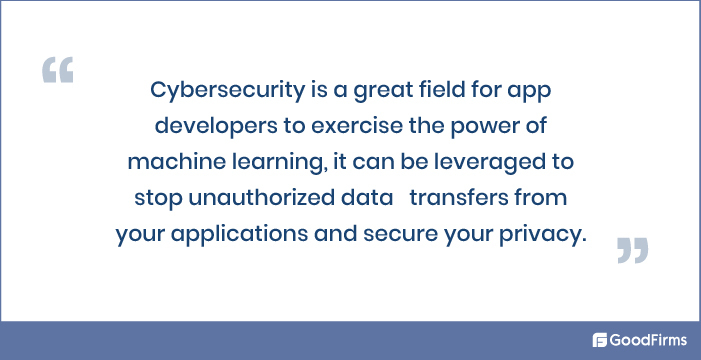
5. Tracking and Monitoring
Tracing patterns of voice, face, and words and translating them as per the preferences set by the users or as most preferred by them, even without specifying such settings, can be done through machine learning. The ease of convenience this service provides to the user if they seek information in a language not known to them is pretty intuitive. This happens when an app monitors the activity and registers the usual preferences of the user to give the best output. App developers can create apps that include this intuitive translation.
6. Data Mining
Data mining is a technique for extracting useful information from extensive data collections. It entails looking for patterns in a large amount of data. Machine learning algorithms aid in discovering all possible relationships among data sets.
Let's take a look at a travel application as an example. A manual technique to analyze possible variations and customer behavior patterns is impossible for businesses. So they collect all of the user data, such as gender, age, how frequently they use the app, and how often they travel, and then use machine learning algorithms to extract useful information about the consumers.
Benefits of Machine Learning in Mobile Applications for Different Industries:
Let us take a look at how integrating machine learning in the apps for different industries can improve their efficiency and effectiveness.
1. Healthcare
Machine learning can be extremely useful in mobile healthcare applications that use symptom input by the users as primary data to guide them to the best doctors and medical treatments available for their ailments.
Many healthcare facilities use machine learning to devise health plans for their patients and provide them with the best treatments as per their conditions. Nowadays, many mobile-health apps are equipped with ML that tracks their conditions and alerts them to seek help when their symptoms are triggered.
Health-conscious people are often seen wearing fitbits and other tracking devices like smartwatches that share the data of their daily physical activity with the users in real-time on the app. You can keep track of your calorie consumption, daily steps, and heart health, to name a few.
2. Finance
The most important role of ML in finance apps is eradicating manual labor and automating repetitive data and tasks. Productivity is of utmost importance in the finance sector, and ML ensures that finance applications give their users the most accurate and precise information.
Based on the user’s daily or monthly activity, ML in finance apps can schedule bill payments on a weekly and monthly basis and suggest the best investment schemes and plans as per their risk portfolio.
Apart from this, the finance industry relies heavily on data, and ML helps structure that data and analyze the outputs faster than human capabilities. Fraud detections and heightened security details with the help of ML are also extremely useful to the finance sector for their apps.
3. Marketing and E-commerce
With the integration of ML in ecommerce apps, businesses can have significant increases in their sales and brand awareness. Targeted ads across different platforms, in line with the user’s search and purchase history will improve personalization of the app.
Ads targeted towards people with specific interests and liking can gain relevant audience and responses. The products and services a user will be recommended online will be tailored on their previous searches and purchases offering better rates and discounts, overall improving the transaction with secure payment gateways as well.
4. Cybersecurity
As mentioned above, ML has a lot of potential in detecting fraudulent activities and securing the data and other important information of users on mobile apps.
Many banking apps have already added features of biometric login to add additional security for mobile banking apps. By integrating ML and two-factor authentication, online banking can be made as secured as possible. ML can analyze incident reports, and patterns of breach in security to alert users and banks of any suspicious activity done from their accounts.
Popular Machine Learning Examples:
The best way to understand any concept is understanding it through examples. Here we have included examples that are widely used and globally present.
1. Netflix
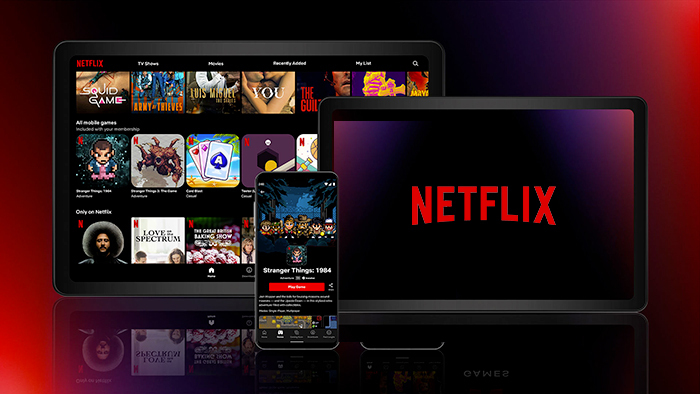
(Credit: Netflix)
Have you noticed how Netflix offers you content that you are most interested in watching? Whether it is an entertainment category such as horror or comedy or shows from a different region such as K-dramas, Netflix is very sensitive to your content consumption patterns.
This is possible through a combination of machine learning and artificial intelligence.
2. Tinder

(Credit: Tinder)
The world’s most popular app for meeting new people relies on machine learning to improve its matching percentage. The app analyzes how the user swipes left or right on recommended profiles and uses that data to predict which photos or other mentioned features get swiped right the most to present the most number of perfect matches.
3. Uber

(Credit: Uber)
The uber ride app uses a mix of machine learning and geodata for destination prediction. It takes into account the user’s live location, time, and previous rides to predict the most likely destination. If you use the app daily to and fro from office to home, it will automatically save those settings and recommend them to you at the exact timings daily.
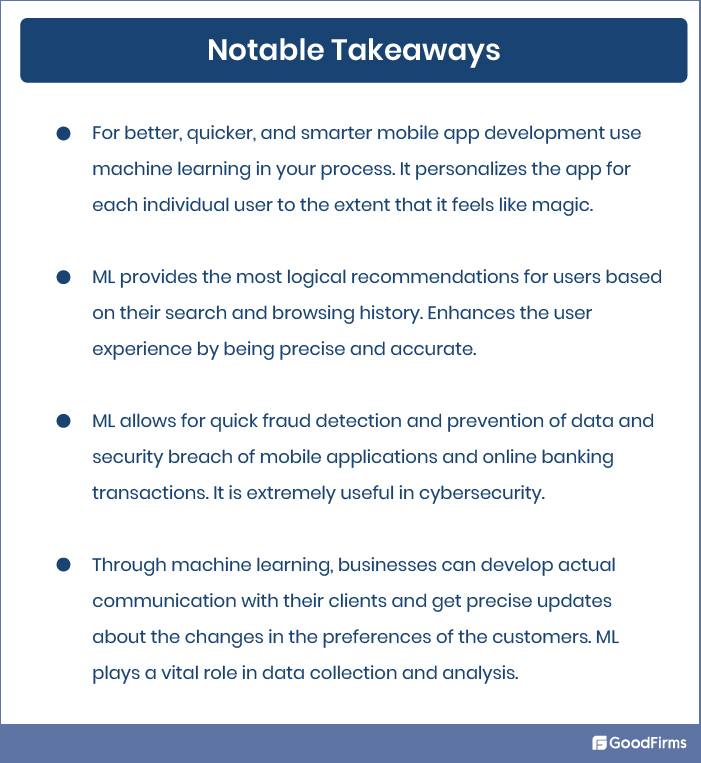
Conclusion
Automation is transforming our lives one click at a time. Mobile applications are becoming more brilliant for the convenience of users. And behind all of that lies machine learning. With the continuous evolution of machine learning and AI, the next-gen apps are predicted to be more intuitive and user-centric. So app developers should board the train of integrating ML into their app development process and reap the benefits of a better and improved application.





